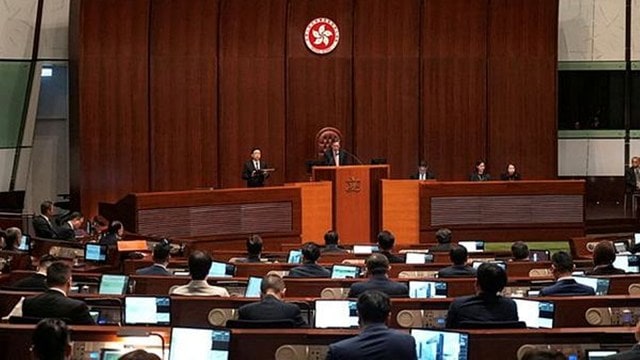Hong Kong legislature unanimously passes national security bill: What is it?
The passing of the 'Safeguarding National Security Bill' comes in the wake of a political crackdown sparked by the 2019 pro-democracy protests.
 Hong Kong Chief Executive John Lee delivers a speech after the Safeguarding National Security Bill was passed. (Reuters photo)
Hong Kong Chief Executive John Lee delivers a speech after the Safeguarding National Security Bill was passed. (Reuters photo)The Hong Kong legislature on Tuesday passed a new national security law unanimously, granting the government more power to curb dissent. The passing of the ‘Safeguarding National Security Bill’ comes in the wake of a political crackdown sparked by the 2019 pro-democracy protests, wherein hundreds of thousands of protesters dressed in white marched in the streets of Hong Kong Sunday in the biggest protest since the Umbrella Revolution of September-December 2014. The protesters were marching against proposed changes in the law that would allow suspects accused of crimes such as murder and rape to be extradited to mainland China to face trial.
Did Hong Kong have a security law before this?
Following the protests in 2019, Beijing had already imposed a national security law four years ago, which was used to prosecute several leading activists – media tycoon Jimmy Lai and former student leaders like Joshua Wong and Lester Shum being the prominent faces. Other vocal individuals and organisations like civil society groups as well as pro-democracy media outlets Apple Daily and Stand News were either silenced or closed down.
While Beijing and the Hong Kong governments said the law brought about stability in the region, a large number of young professionals and middle-class families moved to Britain, Canada, Taiwan, Australia, United States among other countries.
What is the ‘Safeguarding National Security Bill’ passed today?
The ‘Safeguarding National Security Bill’, which will come into effect on March 23, extends the government power to curb any future dissent or challenges that might arise. This includes expanding the scope of punishing treason and insurrection upto life imprisonment.
The law brings about changes in the punishments for other offences as well, including upto 20 years for espionage and 10 years for unlawful disclosure of state secrets. With the law allowing criminal prosecution for specific acts committed anywhere in the world, it also incorporates provisions for imposing tougher penalties on people convicted of working with governments in foreign countries to commit crimes. Working with external forces to commit offences can now be punished by up to 10 years imprisonment, with the prosecution not required to prove intent to incite public disorder or violence.
Why has a new law been imposed?
The law, which will help curb disruptive protests, has been brought in specifically with the justification that it is necessary in case a repetition of the 2019 agitation occurs. Hong Kong leader John Lee, while establishing the need for the law, referred to the 2019 protests and said the legislation was long-overdue. He further said that the law would protect the region against “potential sabotage”. “This is a law to tell people not to attack us,” Lee said, while adding that some foreign agents were still active in Hong Kong.
Given that Hong Kong’s mini-constitution requires it to have a national security law in place, the initial attempt at bringing in such a law was made in 2003. This led to almost half-a-million people protesting against this move, in the fear that it would affect the freedoms that the city enjoyed.
Who will the new law affect?
The provisions related to offences such as the disclosure of state secrets, which may often lead to grey areas, have created a fear in financial professionals dealing with sensitive information. In addition to this, foreign investors have said that the cost of complying with the new law might deter some businesses, forcing them to invest in other countries.
The law also would be a cause for concern for journalists, with Hong Kong Journalists Association also highlighting the provisions for state secrets, which do not require proof of intent to harm national security. The government has added a public interest defence in the new bill, while saying that it targets “an extremely small minority of people” endangering national security.
However, the provisions under the law could negatively affect the activists who are accused of breaking the sedition law, handing them a maximum prison term of seven years, instead of the initial penalty of two years. Amnesty International’s China Director Sarah Brooks said that offenses related to “external interference” could lead to the prosecution of activists who interacted with overseas individuals or organizations, the Associated Press reported.
Accused in national security cases would also face challenges, with the new legislation allowing police officers to apply for extension of custody without charges and prohibit them from consulting their legal counsel. Authorities have also been permitted to impose financial sanctions on individuals who have fled abroad, preventing them from being hired, renting out property or starting businesses.
Apart from people committing offences, the law also requires Chinese citizens to report to authorities if they have knowledge of any person committing treason. Failure to comply with this could result in maximum punishment of up to 14 years in prison.
–With inputs from AP
- 01
- 02
- 03
- 04
- 05































